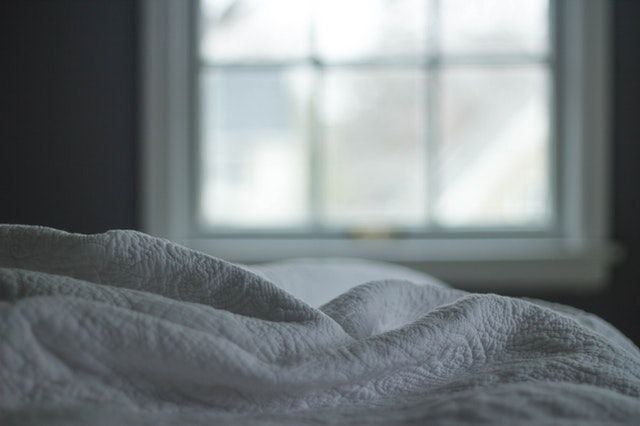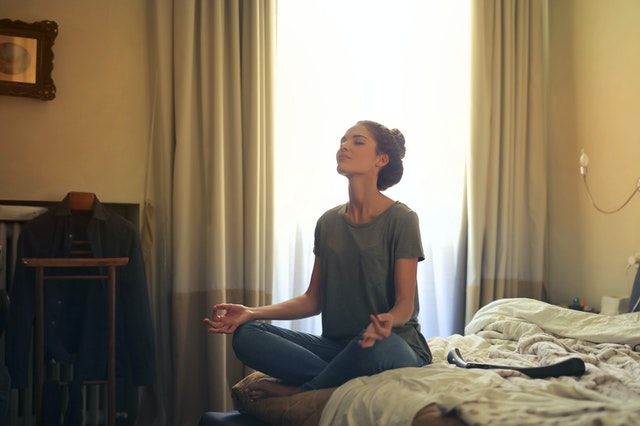Coping With Insomnia
Telling my inner voice to be quiet is my latest tactic to cope with intermittent bouts of insomnia I get and it is proving quite effective.

I think I have always been affected by bouts of insomnia. Growing up, I recall describing long periods of not being able to sleep to others and being surprised that everyone did not have the same problem. It is only lately that I have put the label insomnia on not being able to drift off at night or waking in the middle of the night without being able to go back to sleep.
Probably the main cause of insomnia for me is when my anxiety levels are raised. Some stressful event in school, working or personal life preyed on my mind and stopped any chance of sleep.
Another, related source of sleeplessness is excitement. As anyone with young children on Christmas Eve will know, it can be difficult to convince them to settle down and go to sleep.
My coping method as a young person was to believe that I was still getting good rest even though I was not asleep. Eventually I would drift off or back to sleep. It helped that I did not go through this every night; it has been an intermittent rather than constant problem for me.
As an adult, I developed different coping techniques. Here is a brief list of some of the tactics I use and how useful or not they are for me. I’ll leave my newest and, at the moment, most effective, until last. The others go through phases of working and not working. Choosing the appropriate one can be difficult to do in the middle of the night.
Daydreaming
The thinking here is that as long as I am awake, I may as well enjoy a good daydream. This is where you let your imagination run wild with a fantasy; something you could never do in real life but would like to imagine you could. A daydream can take your mind off the fact that you are not sleeping. It can also stop repetitive thoughts and cycles of anxious worrying about whatever it is that is keeping you awake so that you relax and eventually fall to sleep.
The downside is that it can fuel your wakefulness. You may find yourself an hour later still swimming in the blissful sea of make believe. Ultimately you may have to end the daydream and try another tactic to get off to sleep.
Mindfulness Meditation
I remember my mother teaching me some mindfulness meditation and giving me a copy on tape of a guided meditation. This was probably around the time of some important exam and it did have a positive effect. More recently I have used guided meditations to help drift off to sleep; and I do so on most nights.

When insomnia strikes I have tried to use the techniques learned but doing so without the guidance. Sometimes it works, but it’s not guaranteed. The meditation is not always able to take attention away from whatever is feeding the anxiety. The next step is to try a guided meditation and this is more successful but unfortunately not guaranteed to help.
By the time full cycle of trying a meditation myself, failing, getting headphones (I don’t want to wake my wife), and listening to a meditation, an hour may have passed. It is not a technique I like to rely on.
Reading and Other Pastimes
The advice here is that when insomnia strikes, that you should not stay in the bed. Change the environment and do an action to relieve stress. For me this would be reading a novel or magazine. Other options such as making a jigsaw, drawing, or listening to an audio book are also effective, as long as they can be done without too much physical activity. When about half an hour has passed, go back to bed.
I have always been a bedtime reader, keeping an in-progress book at my bedside. Reading feels like a preamble before sleep, so maybe this has been the most effective method for me, as I often feel my eyelids get heavier as I read, signalling to my body to prepare for shutdown.
However, the fact that I have to get out of bed is a big deterrent to choosing this form of action. It means writing off at least thirty minutes of sleep time, when I will not even be resting. There is a danger of disturbing the other sleepers in the house (yes, I have set off the house alarm in the middle of the night before!) and it might not even work. So often I don’t want to try this unless it is a last resort.
Making a List
Sleeplessness can be fuelled by an upcoming busy day, one that you really need a good night sleep to be ready for. The fact that you are lying in bed worrying about everything you have to do tomorrow is made ten times worse by the thought that you are not getting any rest. No matter how hard you try, the items will keep circling round and round in you mind not allowing any chance of sleep.
A tactic that I’ve used on such nights is to get a pen a paper and list down everything that is on my mind. Writing them down is like putting them into another room, allowing you to finally drift off. I’ve been able to use this tactic without leaving the bed, simply by making a mental list. The list needs to be short, say the top three important things that you have to address.
Journaling
An extension of the list idea is to get into the habit of keeping a journal. Before bed every night write down a few thoughts about how things are going and your plans for the next day. This can be a pre-emptive way to avoid waking in the middle of the night. Keep it short; this should be a simple, short ritual before bedtime. Write less than you want to write, but do it every day.
I have kept a journal for a couple of years now, rarely missing a day, but I must admit that I no longer do it before bedtime. Now it is one of the first things I do every day. Perhaps I should move it back to the end of the day to unlock its benefits for ensuring a quality night of rest.
What Can I Do About it Now?
When things are bothering you and anxiety levels are high, it can feel impossible to organise or control the thoughts racing through your mind. It sometimes feels like feeding time in an overcrowded monkey cage at the zoo. No amount of distraction, meditation or list making will help, or at least that is how it might feel.
By asking the above question to yourself, you force yourself to face the fact that there is usually nothing that can be done at that point. No action that is taken at 3 a.m. will help solve the problems. Realising this can sometimes remove the dread and anxiety, if only for that night. At least it might give enough time for a few hours of real rest.
An extension of this might be, what can I do first thing in the morning? Or what is the smallest thing I can do tomorrow that will start to address the problem? If you can figure out an action, no matter how small, that will help things, it can be enough to relieve a little stress.
Cafeine and Sugar Restriction
I drink all my coffee by about 2 p.m. each day. After that I go on complete caffeine lockdown. It is difficult to be sure if this is effective or not, but I usually have no trouble drifting off to sleep. If there is any correlation between the bouts of insomnia in the middle of the night and any breach of the caffeine intake rule, I cannot be sure about it.

The half-life of caffeine — the time it takes caffeine to reduce by half in your bloodstream — is different for everyone. On average it five hours. That means that be 7 p.m. I will still have half the effect of an espresso from 2 p.m. running through my blood. Caffeine inhibits the bodies instinct to sleep so if nothing else is helping insomnia, then perhaps giving up coffee and tea is a good option. Thankfully I have not had to go down this road; I like my three cups of coffee in the morning too much.
Silence the Inner Voice
We all have an inner voice that hovers between the conscious mind and the sub-conscious. It can often be a lot less stable than the rationale, thinking self and will bring up any amount of random things. It is linked closely to the fight or flight instincts and other extra preceptory feelings that we have inherited and honed over the millennia of human evolution.
It can also keep us up during the night. It tends to overreact to things, to amplify feelings and exaggerate everything beyond reason. When it gets going, it can be like a wild animal within our heads that pulls and pokes at everything to ensure the conscious mind is completely agitated and wide awake, ready to react to things in the real world.
Meditation focuses not on calming this inner voice, but on listening to it and accepting it. It teaches a sense of equanimity to the things it brings up. Being aware of what is lurking in your subconscious can be empowering, enabling action to deal with whatever is causing the problem directly. But is the middle of the night a good time to try to understand your inner self?
I have tried. But equanimity is almost impossible to find when you are low on sleep and dawn, and everything that its light brings, is creeping up fast.
My tactic, that is working for a few weeks now, is to cut this inner voice off every time it tries to say anything. Think of the children’s game Silence in the Courtyard as an example. Every time it pipes up, just shut it down. No equanimity. No attempt to understand it. Just tell it to “Shut up”!
Ignoring the waves of emotion that are bubbling up from the vast sea of the subconscious (over 95% of the brain) can be problematic. Over time our actions will be determined as automatic responses we are not even aware of. I am not suggesting that we try to suppress the inner voice, just not to listen to it at 4 o’clock in the morning.
It works too. After a dozen or so quelled outbursts the voice can become surly and simply accept that no one is going to listen to it. Sleep follows quickly afterwards.
Perhaps this trick works because I do spend time each day meditating. Each session, even if it is only for a few minutes, helps to strengthen the skills to notice and silence the inner voice.
It is also important to try to treat the underlying cause of whatever is causing the wakefulness. In theory this tactic will allow you to get a few nights of restful sleep so that you can address the issue at a time and place of your own choosing. Being able to select the time and place of a battle can be vital in securing victory.
Not that it has to be a struggle. But making time for a meditation session, when you are rested and not under pressure will allow you to find that equanimity that is needed to deal with the problems that can lie beneath the surface of the subconscious.
With some luck, you can silence that voice that speaks in the middle of the night and give yourself the rest that you need. If meditation is not your thing, I’d encourage you to try some of the other tactics, but do so when you are fully rested.
Also reach out to a friend of family member for help or just to chat. No one will relish a middle of the night call, but the tactic is designed to get you through the night without further distress so that you can make the call at a more reasonable hour. Speak to a councillor or a mentor if necessary.
Sleep well.

